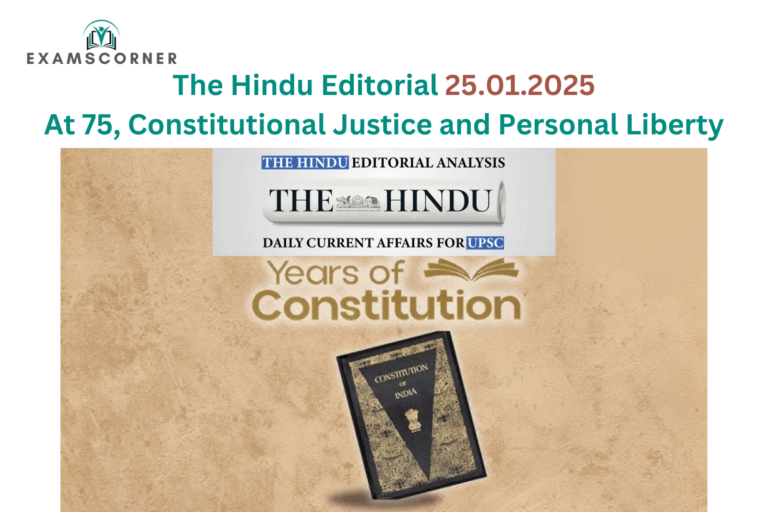As India celebrates 75 years of its Constitution, it is a moment to reflect deeply on its foundational values, particularly the right to personal liberty as a cornerstone of justice. While the Constitution continues to be hailed as a robust framework for democracy, there is an undeniable ethical and moral crisis in how its principles are sometimes interpreted and implemented. The essence of personal liberty and human dignity, vital to the constitutional vision, demands our urgent attention.
Reinstating Dissent as a Constitutional Ethic
The case of A.K. Gopalan vs. State of Madras (1950) serves as a critical turning point in the discourse of personal liberty. Justice S. Fazl Ali’s dissenting opinion in this case, which focused on upholding Gopalan’s right to political dissent, was unanimously reinstated by the Supreme Court in the Puttaswamy vs. Union of India (2017) judgment.
This moment was significant, as it declared the preventive detention of communist leader A.K. Gopalan and the Supreme Court’s majority ruling at the time to be judicially flawed. From a constitutional ethics perspective, the earlier judgments that curtailed liberty were seen as erroneous. The technicalities of interpreting fundamental rights were inseparable from the centrality of personal liberty in the Constitution.
The Central Role of Article 21
Article 21 of the Constitution guarantees the right to life and personal liberty. It ensures the dignity of the individual, promoting the holistic development of every human being. Justice R.F. Nariman, in the Puttaswamy judgment, underscored this value, emphasizing that the Constitution is designed to be “workable,” “flexible,” and “strong” to meet contemporary challenges.
The Preamble of the Constitution plays a vital role in guiding the nation, particularly in times when political discourse fragments narratives, such as the ‘tukde tukde’ rhetoric. By holding the country together, the Preamble provides a moral compass for justice and liberty.
Contemporary Challenges: Preventive Detention and Arbitrary Arrests
Rituals of Humiliation
Preventive detention, arbitrary arrests, and denial of fair trials through impunity in anti-terror laws create a “ritual of humiliation.” These practices inflict profound harm on conscientious dissenters and undermine the principles of justice.
Juxtaposing Past and Present
In 1950, A.K. Gopalan stood against constitutional contradictions and was detained for his dissent. Today, contemporary dissenters such as Umar Khalid, Sharjeel Imam, and Gulfisha Fatima, who protested against the Citizenship (Amendment) Act (CAA), face similar repression through incarceration, demolitions, and dispossession.
The Escalation of Preventive Detention and Custody
By 2017, preventive detention and prolonged custody without bail became widespread, often sanctioned by constitutional courts. Numerous laws at both state and central levels have allowed detention and custody with minimal safeguards, turning the process itself into a form of punishment.
Young dissenters, particularly those who challenged the CAA in 2019, are ensnared in anti-terror laws that facilitate indefinite detention. The juxtaposition of constitutional values with these harsh realities highlights a growing trend of criminalizing dissent while failing to uphold personal liberty.
Historical and Contemporary Parallels
A.K. Gopalan’s Struggles
In his memoir In the Cause of the People: Reminiscences (1973), A.K. Gopalan recounts his repeated arrests and the trials he endured while fighting for liberty under both British and independent India. On August 15, 1947, Gopalan celebrated Independence Day in jail, only to face new charges of treason.
Despite filing numerous petitions, Gopalan remained imprisoned, illustrating the enduring struggle for personal liberty. His experiences resonate with today’s anti-CAA protesters, many of whom have spent years in custody with little judicial intervention to secure their release.
Anti-CAA Protesters
Anti-CAA dissenters, such as students and community leaders, face prolonged incarceration akin to Gopalan’s plight. Unlike Gopalan’s era, courts today have shown less urgency in addressing their detentions. The persistence of colonial-era laws like the Preventive Detention Act, 1950, in modern India underscores the continuity of systemic repression.
The Way Forward: Creative Constitutionalism
The arrests in the Bhima Koregaon case and the detentions of anti-CAA protesters highlight the urgent need for judicial interventions. Constitutional courts must adopt “creative constitutionalism,” a concept championed by Professor Upendra Baxi, to protect personal liberty and uphold justice.
The Constitution cannot afford another prolonged period of misinterpretation that undermines its ethical spirit. It is essential to ensure that personal liberty remains central to the Indian judiciary’s vision of justice.
Conclusion
As we mark the 75th anniversary of the Indian Constitution, it is imperative to reflect on its ethical and moral essence. The right to personal liberty must be preserved as a non-negotiable pillar of justice. The stories of A.K. Gopalan and contemporary dissenters like those opposing the CAA remind us of the ongoing struggle to uphold constitutional values.
India cannot wait another seven decades to recognize and rectify its constitutional contradictions. The time to act is now—to protect personal liberty and strengthen the Constitution’s foundational promise of justice.



